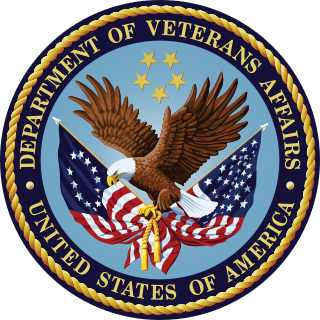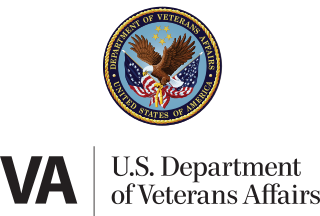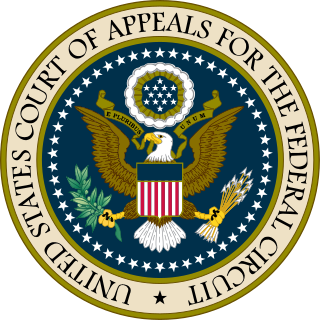
The United States Department of Veterans Affairs (VA) is a federal Cabinet-level agency that provides near-comprehensive healthcare services to eligible military veterans at VA medical centers and outpatient clinics located throughout the country; several non-healthcare benefits including disability compensation, vocational rehabilitation, education assistance, home loans, and life insurance; and provides burial and memorial benefits to eligible veterans and family members at 135 national cemeteries.

A veteran is a person who has had long service or experience in a particular occupation or field. A military veteran is a person who has served and is no longer serving in the armed forces. Those veterans that have had direct exposure to acts of military conflict may also be referred to as war veterans. A combat veteran is a person who has fought in combat during a war or a skirmish against a declared enemy and may still be serving in the military.

A military discharge is given when a member of the armed forces is released from his or her obligation to serve. Each country's military has different types of discharge. They are generally based on whether the person completed their training and then fully and satisfactorily completed their term of service. Other types of discharge are based on factors such as the quality of the person's service, whether their service had to be ended prematurely due to humanitarian or medical reasons, whether the person had been found to have drug or alcohol dependency issues and whether they were complying with treatment and counseling, or whether the person had demerits or punishments for infractions or were convicted of any crimes. These factors affect whether they will be asked or allowed to re-enlist and whether they qualify for benefits after their discharge.

The Veterans Health Administration (VHA) is the component of the United States Department of Veterans Affairs (VA) led by the Under Secretary of Veterans Affairs for Health that implements the healthcare program of the VA through the administration and operation of numerous VA Medical Centers (VAMC), Outpatient Clinics (OPC), Community Based Outpatient Clinics (CBOC), and VA Community Living Centers Programs.
The Global Assessment of Functioning (GAF) is a numeric scale used by mental health clinicians and physicians to rate subjectively the social, occupational, and psychological functioning of an individual, e.g., how well one is meeting various problems-in-living. Scores range from 100 to 1.

The Veterans Benefits Administration (VBA) is an agency of the U.S. Department of Veterans Affairs. It is responsible for administering the Department's programs that provide financial and other forms of assistance to veterans, their dependents, and survivors. Major benefits include Veterans' compensation, Veterans' pension, survivors' benefits, rehabilitation and employment assistance, education assistance, home loan guaranties, and life insurance coverage.
Social Security Disability Insurance is a payroll tax-funded, federal insurance program of the United States government. It is managed by the Social Security Administration and is designed to provide income supplements to people who are physically restricted in their ability to be employed because of a notable disability, usually a physical disability. SSD can be supplied on either a temporary or permanent basis, usually directly correlated to whether the person's disability is temporary or permanent.
Income Support is an income-related benefit in the United Kingdom for some people who are on a low income. Claimants of Income Support may be entitled to certain other benefits, for example, Housing Benefit, Council Tax Reduction, Child Benefit, Carer's Allowance, Child Tax Credit and help with health costs. A person with capital over £16,000 cannot get Income Support, and savings over £6,000 affect how much Income Support can be received. Claimants must be between 16 and Pension Credit age, work fewer than 16 hours a week, and have a reason why they are not actively seeking work.
Heckler v. Campbell, 461 U.S. 458 (1983), is a United States Supreme Court case concerning whether the United States Secretary of Health and Human Services could rely on published medical-vocational guidelines to determine a claimant’s right to Social Security benefits.
Employment and Support Allowance (ESA) is a United Kingdom welfare payment for adults younger than the State Pension age who are having difficulty finding work because of their long-term medical condition or a disability. It is a basic income-replacement benefit paid in lieu of wages. It is currently being phased out and replaced with Universal Credit.
Sullivan v. Zebley, 493 U.S. 521 (1990), was a landmark decision by the United States Supreme Court involving the determination of childhood Social Security Disability benefits. In the decision, the Supreme Court ruled that substantial parts of the Supplemental Security Income program's regulation on determining disability for children were inconsistent with the Social Security Act; particularly, the statutory standard of “comparable severity.” The suit highlighted what some felt was the need for a step in the evaluation of childhood disability claims that would be akin to the functional evaluation considered in many adult claims. It resulted in the addition of a consideration of functioning, and not merely medical severity, in children's SSI claims. The decision was rendered on February 20, 1990.
The President's Commission on Care for America's Returning Wounded Warriors, also known as the Dole-Shalala Commission, was established on March 6, 2007 when U.S. President George W. Bush signed Executive Order 13426. The Commission was established to examine and recommend improvements to the effectiveness and quality of transition from to return to military service or civilian society, health care, benefits, outreach to Service members and awareness by Service members of health care and benefits programs.

The Army Wounded Warrior Program (AW2) is the official U.S. Army program that assists and advocates for severely wounded, ill or injured Soldiers, Veterans, and their Families and Caregivers, wherever they are located, regardless of military status. Soldiers who qualify for AW2 are assigned to the program as soon as possible after arriving at the Warrior Transition Unit (WTU). AW2 supports these Soldiers and their Families throughout their recovery and transition, even into Veteran status. Through the local, personalized support of AW2 Advocates, AW2 strives to foster the Soldier's independence. There are more than 20,000 severely wounded, ill and injured Soldiers and Veterans currently enrolled in AW2.

The United States provides a wide range of benefits for veterans with posttraumatic stress disorder (PTSD), which was incurred in, or aggravated by, their military service. The United States Department of Veterans Affairs (VA) will provide benefits to veterans that the VA has determined suffer from PTSD, which developed during, or as a result of, their military service. These benefits not only include tax-free cash payments but can also include free or low-cost mental health treatment and other healthcare; vocational rehabilitation services; employment assistance; independent living support; and more.

The Board of Veterans' Appeals is an administrative tribunal within the United States Department of Veterans Affairs (VA), located in Washington, D.C. It determines whether U.S. military veterans are entitled to claimed veterans' benefits and services. The Board's mission is to conduct hearings and decide appeals properly before the Board in a timely manner. 38 United States Code (U.S.C.) § 7101 (a). The Board's jurisdiction extends to all questions in matters involving a decision by the Secretary under a law that affects a provision of benefits by the Secretary to Veterans, their dependents, or their Survivors. 38 U.S.C. §§ 551(a); 7104(a). Final decision on such appeals are made by the Board based on the entire record in the proceedings and upon consideration of all evidence and applicable provisions of law and regulation. The Board's review is de novo.

Sanchez-Benitez vs. West is a United States Court of Appeals for Veterans Claims case that dealt with the general requirement of a formal diagnosis for service connection.

Buchanan vs. Nicholson is a United States Court of Appeals for the Federal Circuit case that dealt with the credibility of lay evidence as it pertains to Veterans claims.

Esteban vs. Brown is a United States Court of Appeals for Veterans Claims case that dealt with the pyramiding rule.

Nieves-Rodriguez vs. Peake is a United States Court of Appeals for Veterans Claims case that dealt with the adequacy and weighing of medical opinions.
Kisor v. Wilkie is a pending US Supreme Court case related to the interpretation of regulations by an executive agency of its own ambiguous regulations.









